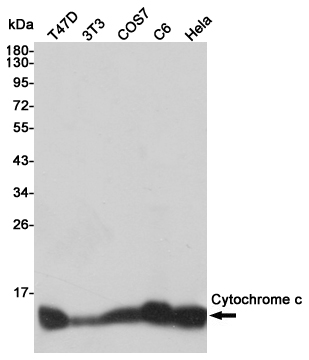-
Product Name
Anti-Cytochrome C (7C10) Mouse antibody
- Documents
-
Description
Cytochrome C (7C10) Mouse monoclonal antibody
-
Tested applications
WB, ICC/IF, IHC-P
-
Species reactivity
Human, Mouse, Rat, Chicken
-
Isotype
Mouse IgG1
-
Preparation
Antigen: Recombinant Protein of CYCS
-
Clonality
Monoclonal
-
Formulation
PBS, pH 7.4, containing 0.02% sodium azide as Preservative and 50% Glycerol.
-
Storage instructions
Store at 4°C short term. Store at -20°C long term. Avoid freeze / thaw cycle.
-
Applications
WB: 1/1000-5000
IHC: 1/500-1000
IF: 1/200
-
Validations

Western blot detection of Cytochrome c in T47D,3T3,COS7,C6 and Hela cell lysates using Cytochrome c mouse mAb (1:10000 diluted).Predicted band size:14kDa.Observed band size:14kDa.
-
Background
Swiss-Prot Acc.P99999.Electron carrier protein. The oxidized form of the cytochrome c heme group can accept an electron from the heme group of the cytochrome c1 subunit of cytochrome reductase. Cytochrome c then transfers this electron to the cytochrome oxidase complex, the final protein carrier in the mitochondrial electron-transport chain.Plays a role in apoptosis. Suppression of the anti-apoptotic members or activation of the pro-apoptotic members of the Bcl-2 family leads to altered mitochondrial membrane permeability resulting in release of cytochrome c into the cytosol. Binding of cytochrome c to Apaf-1 triggers the activation of caspase-9, which then accelerates apoptosis by activating other caspases.SitesFeature keyPosition(s)Description
Related Products / Services
Please note: All products are "FOR RESEARCH USE ONLY AND ARE NOT INTENDED FOR DIAGNOSTIC OR THERAPEUTIC USE"
